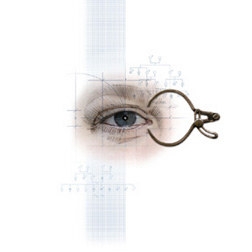 |
This graphic represents Nazi biological policies that sought to “Create the Master Race” – the sub-title of an exhibition at the United States Holocaust Memorial Museum in Washington, D.C. It demonstrates eugenic (racial hygiene) measures undertaken by medical advocates of these policies including geneticists, psychiatrists, and anthropologists. Research, and data collection, especially on morphological characteristics such as eye color, iris structure, etc., and the hereditary transmission of physical and mental traits, formed a “scientific” foundation, or “validation” for Nazi racial ideology. More information is available about the exhibition on the museum’s Web site at www.ushmm.org. |
Next week, UNMC faculty, staff and students will have several opportunities to hear Alan Wells, Ph.D., an expert in medical ethics formerly with the American Medical Association’s (AMA) Institute for Ethics and Patricia Heberer, Ph.D., historian at the Center for Advanced Holocaust Studies at the United States Holocaust Memorial Museum (USHMM), present “The Nazis and Medical Ethics: Context and Lesson.”
Drs. Wells and Heberer will give three presentations in Omaha, including two on the UNMC campus:
- Monday, Sept. 19 – The presentation, geared to UNMC students, will be from 1 until 2:30 p.m. in the Durham Research Center Auditorium.
- Monday, Sept. 19 – The public is invited to a free community-wide lecture at 7:30 p.m. at the Jewish Community Center Theater. The program is sponsored by the Institute for Holocaust Education, Jewish Educational and Library Services, the Jewish Federation of Omaha and UNMC.
- Tuesday, Sept. 20 — The UNMC Department of Psychiatry, the UNMC Institutional Review Board, the UNMC Department of Preventive and Societal Medicine and the UNMC Center for Continuing Education, is sponsoring a grand rounds event from noon until 1:30 p.m. in the Eppley Science Hall Amphitheater. Lunch will be provided. Participants may receive 1.8 nursing contact hours, 1.5 category 1 credit toward the American Medical Association Physician’s Recognition Award and AMA PRA Category 1 credit.
“Often what people know about the Holocaust and World War II doesn’t include the specifics of what happen in medicine, or if it does, it is related to notorious human subject research,” said Toby Schonfeld, Ph.D., assistant professor, Section on Humanities and Law, UNMC Department of Preventive & Societal Medicine. “The history of medicine during the Nazi era, in fact, is much more complex than that.”
“Even in a contemporary political context, physicians may still have to make a choice whether to follow the masses or act according to their personal value systems,” Dr. Schonfeld said. “There are lessons we can learn from the Holocaust about what we ought or ought not to do.”
Drs. Wells’ and Heberer’s presentations focus on the role that Nazi medical practices played in the development of medical ethics and the lessons today’s physicians have learned from the period leading up to the Holocaust. A collaboration between the AMA Council on Ethical and Judicial Affairs and the United States Holocaust Memorial Museum also has produced a special exhibition at the museum titled “Deadly Medicine: Creating the Master Race,” which runs through Oct. 16.
“During the 1930s, the German medical establishment was admired as a world leader in innovative public health and medical research,” Dr. Wells said. “The question we are asking is: ‘How could science be co-opted so that doctors as healers evolved into killers and medical research became torture?’ ”
According to Dr. Wells, World War II era Germans were extremely advanced in medicine, technology and public health research but these successes have largely been overlooked by history because of the medical extremes of the Holocaust. For example, Germany was the first to have a high-powered electron microscope, the first to document the link between asbestos and lung cancer, and an innovator in developing high profile public health campaigns for a variety of health issues – such as anti-smoking campaigns and promoting breast self-examination to help detect tumors at an early stage. These advances and campaigns, however, were eventually aimed exclusively at the “Aryans” – the Nazi ideal of the “master race.”
“The story of medicine under Nazism is instructive and an important theme in understanding the evolution of the Holocaust,” Dr. Heberer said. “The collaboration of the USHMM and the AMA Institute for Ethics presents a unique opportunity to explore this topic, both in terms of history and contemporary issues, and to bring the lessons drawn to students, physicians, and faculty in universities around the country.”
“Many of the most important issues in medical ethics today – from genetic testing and stem cell research to the humane treatment of prisoners of war – are directly affected by the experiences of medicine leading up to and during the Holocaust,” Dr. Wells said. “Physicians need to explore these issues without getting caught up in political agendas or the results can be something we never intended and cause great harm.”
“We want to understand why healers became killers and use our understanding as a guide for medicine today,” Dr. Wells said. “Even though the horrors of the Holocaust seem to be so long ago, we can never forget this history because it continues to affect medical ethics today. For example, one reason doctors today are so concerned about racial and ethnic health disparities is because our codes of ethics demand that we treat every person equally, without regard to race or ethnic background. This ethical obligation is a direct outgrowth of the horrors of Nazi medicine.”
For more information, contact Toby Schonfeld at 559-2921.
A public lecture also will be Wednesday, Sept. 21, at 4:30 p.m. at the University of Nebraska at Lincoln Great Plains Gallery. Individuals from the medical field may earn continuing medical education credit for attending one of these lectures.